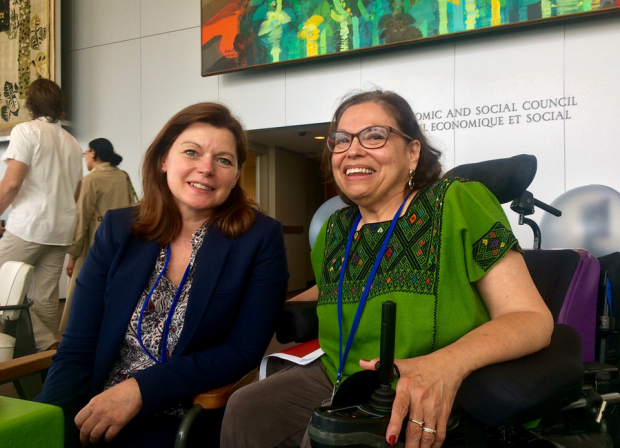I'm just back from New York.
I was representing the UK at the Conference of State Parties to the Convention on the Rights of Persons with Disabilities. This is a yearly meeting where governments and civil society come together to discuss and implement the UN Convention of the Rights of Persons with Disabilities (CRPD).
This year’s theme was on how we make sure the rights of persons with disabilities are integral to the post-2015 development agenda..
We have made some real strides forward, but we need to keep the pressure on. We must ensure that inclusion is really locked into the Sustainable Development Goals, at the indicator level, if we are to make sure that no one is left behind. ,
For me there were four major points:
- We need to push hard now and not wait for the agreement of the new goals framework. We need to make sure we have the statistics we need to properly understand the lives and challenges of people with disabilities and can achieve this by using the Washington Group questions. The Australian Government are funding critical capacity building in the UN Statistical Division (UNSD) which will help countries rise to this challenge but we all need to work on this. Alex Jones, our Statistics Adviser in Zimbabwe, has already demonstrated how DFID can support countries to hardwire these questions into their census. With the 2020 round of censuses on the horizon there are lots of opportunities. It's great that UN Economic and Social Council passed resolution on disability data disaggregation last week but we all need to translate that into practice. We need to act now.
- People with disabilities must be involved in decisions about inclusive programming.. Too often decisions are being made about the lives of people with disabilities without involving them. This is not good enough. I'm challenging all of our Heads of Office to bring people with disabilities in to decision making processes.
- We can't accomplish the progress we need on disability inclusive development on our own. All of our development partners need to step up. It was great to see the Australian Government publish their inclusive strategy "development for all" but this needs to be the norm and not an exception.
- That we are experiencing ever more humanitarian crises and that our responses need to change to better serve the needs of people with disabilities. We talk a lot about vulnerability but I want that to change. People with disabilities may be at greater risk in humanitarian situations but it's because our responses are not inclusive enough not because they are innately vulnerable. Our approach needs to be underpinned by the social model of disability. In the lead up to the World Humanitarian Summit we need think hard about we involve people with disabilities and how we make sure their voices inform a new humanitarian landscape. The World Humanitarian Summit Secretariat is holding an online consultation with people with disabilities to ensure their voices are heard and I would encourage people to participate.
The conference was a great opportunity to reconnect with colleagues like Vladimir Cuk from the International Disability Alliance and Professor Nora Groce from Leonard Cheshire Disability. Their leadership on disability inclusive development has been a guiding light for us here in DFID as we have worked to embed our Disability Framework. It was also a great opportunity to make new contacts like Judy Heumann from the US State Department who is a passionate advocate and Charlotte V. McClain-Nhlapo who is working tirelessly to make the World Bank’s approach more inclusive of persons with disabilities.
I was also delighted to be able to speak at a side event organised by another one of our partners, the Disability Rights Fund, which looked at International Cooperation on disability. Embedding disability within our country office network is important, but it is only one small piece of the puzzle. We will only see change for the one billion people with disabilities around the world when we all come together as a global community.
Those are my thoughts for now. Please feel free to add a comment or get in touch.

Photo: Fiach O’Broin-Molloy, DFID
Sign up for email updates from this blog, and/or follow us on Twitter

Recent Comments